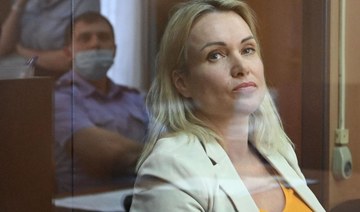HELENA: Montana became the first state in the US to enact a complete ban on TikTok on Wednesday when Republican Gov. Greg Gianforte signed a measure that’s more sweeping than any other state’s attempts to curtail the social media app, which is owned by a Chinese tech company.
The measure, scheduled to take effect on Jan. 1, 2024, is expected to be challenged legally and will serve as a testing ground for the TikTok-free America that many national lawmakers have envisioned. Cybersecurity experts say it could be difficult to enforce the ban.
“Today, Montana takes the most decisive action of any state to protect Montanans’ private data and sensitive personal information from being harvested by the Chinese Communist Party,” Gianforte said in a statement.
TikTok spokesperson Brooke Oberwetter argued that the law infringes on people’s First Amendment rights and is unlawful. She declined to say whether the company will file a lawsuit.
“We want to reassure Montanans that they can continue using TikTok to express themselves, earn a living, and find community as we continue working to defend the rights of our users inside and outside of Montana,” Oberwetter said in a statement.
The American Civil Liberties of Montana and NetChoice, a trade group that counts Google and TikTok as its members, also called the law unconstitutional. Keegan Medrano, policy director for the ACLU of Montana, said the Legislature “trampled on the free speech of hundreds of thousands of Montanans who use the app to express themselves, gather information and run their small business, in the name of anti-Chinese sentiment.”
Some lawmakers, the FBI and officials at other agencies are concerned the video-sharing app, owned by ByteDance, could be used to allow the Chinese government to access information on US citizens or push pro-Beijing misinformation that could influence the public. TikTok says none of this has ever happened.
A former executive at ByteDance alleges the tech giant has served as a “propaganda tool” for the Chinese government, a claim ByteDance says is baseless.
When Montana banned the app on government-owned devices in late December, Gianforte said TikTok posed a “significant risk” to sensitive state data. More than half of US states and the federal government have a similar ban.
On Wednesday, Gianforte also announced he was prohibiting the use of all social media applications tied to foreign adversaries on state equipment and for state businesses in Montana effective on June 1. Among the apps he listed are WeChat, whose parent company is headquartered in China; and Telegram Messenger, which was founded in Russia.
The legislation, drafted by the attorney general’s office, easily passed through Montana’s GOP-controlled Legislature.
Gianforte had wanted to expand the TikTok bill to include apps tied to foreign adversaries, but lawmakers did not send him the bill until after the session ended this month, preventing him from offering any amendments.
Montana’s new law prohibits downloads of TikTok in the state and would fine any “entity” — an app store or TikTok — $10,000 per day for each time someone “is offered the ability” to access the social media platform or download the app. The penalties would not apply to users.
Opponents say Montana residents could easily circumvent the ban by using a virtual private network, a service that shields Internet users by encrypting their data traffic, preventing others from observing their web browsing. Montana state officials say geofencing technology is used with online sports gambling apps, which are deactivated in states where online gambling is illegal.
Though many lawmakers in Montana have been enthusiastic about a ban, experts who followed the bill closely said the state will likely have to defend the legislation in court.
Officials are also bound to receive criticism from advocacy groups and TikTok users who don’t want their favorite app to be taken away. The app’s fun, goofy videos and ease of use has made it immensely popular, and US tech giants like Snapchat and Meta, the parent company of Facebook and Instagram, see it as a competitive threat.
TikTok has been recruiting so-called influencers and small businesses who use the platform to push back on a ban. But others who haven’t been part of an official campaign coordinated by the company are also worried about what lawmakers are doing.
Adam Botkin, a former football player and recent graduate at the University of Montana, said it was a scary time for him as a content creator in Montana. The 22-year-old has nearly 170,000 followers on TikTok, where he mostly posts short videos of himself performing football kicks.
He says he sometimes makes “tens of thousands” of dollars per month from brands looking to market their products on his social media accounts, including Instagram, where he has roughly 44,000 followers.
Botkin says most of his income comes from Instagram, which is believed to be more lucrative for content creators. But he has to grow his following on that platform — and others — to have the same level of popularity that he does on TikTok. He says he’s trying to do that and won’t try to circumvent the TikTok ban by using a VPN.
“You got to adapt and evolve with how things move,” Botkin said. “So, if I have to adapt and move, I’ll adapt.”
Chatter about a TikTok ban has been around since 2020, when then-President Donald Trump attempted to bar the company from operating in the US through an executive order that was halted in federal courts. President Joe Biden’s administration initially shelved those plans, but more recently threatened to ban the app if the company’s Chinese owners don’t sell their stakes.
TikTok doesn’t want either option and has been clamoring to prove it’s free of any Chinese government interference. It’s also touting a data safety plan it calls “Project Texas” to assuage bipartisan concerns in Washington.
At the same time, some lawmakers have emerged as allies, arguing efforts to restrict data harvesting practices need to include all social media companies, not just one. Republican Sen. Rand Paul of Kentucky blocked a bill in March that would ban TikTok nationally, saying such a move would violate the Constitution and anger the millions of voters who use the app.
Montana’s TikTok ban also comes amid a growing movement to limit social media use among kids and teens and, in some cases, impose bans. Several bills circulating in Congress aim to get at the issue, including one that would prohibit all children under the age of 13 from using social media and require permission from a guardian for users under 18 to create an account.
Some states, including Utah and Arkansas, have already enacted laws that would hinge social media use on parental consent. Similar bills are in the works in other states. Last year, California enacted a law requiring companies to beef up data protection practices for children and offer them the highest privacy settings.
Montana says 1st-in-nation TikTok ban protects people. TikTok says it violates their rights
https://arab.news/br6bc
Montana says 1st-in-nation TikTok ban protects people. TikTok says it violates their rights

- Measure due to take effect on Jan. 1, 2024 is expected to be challenged in court
- Governor also announced ban of all social media applications tied to foreign adversaries on state devices
Humanity at a turning point, Saudi minister tells WEF meeting in Riyadh
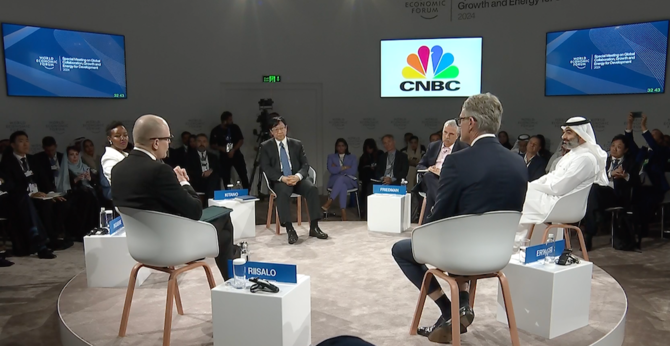
- Saudi Arabia wants to lead ‘intelligence revolution,’ Abdullah Al-Swaha, communications and information technology minister, says
- Industry leaders ‘must master AI within years or face irrelevance’
RIYADH: Humanity is at a turning point, pivoting from digital to artificial intelligence, and shifting from the industrial revolution to the intelligence revolution, a senior Saudi official told the special two-day World Economic Forum meeting in Riyadh.
“The world today is not at a tipping point but at a turning point in humanity, which means weare pivoting from digital to AI and maybe later on quantum,” Abdullah Al-Swaha, minister of communications and information technology, said.
Saudi Arabia is ready to embrace that shift, he added.
“The Kingdom is excited with its partnerships with countries and international organizations to carve a path toward inclusive AI adoption,” Al-Swaha told the panel.
“We are pushing today an inclusive agenda, that is innovative, and indisputably multistakeholder to make sure that we lead and leapfrog in this era.”
The Saudi minister noted that global economic output today is worth $100 trillion, of which $32 trillion is attributed to the labor force, and $1 trillion of that ‘is being augmented, accelerated and democratized by generated AI.’
“Over the next five to seven years, it is projected to go to 40 percent. That’s 43 percent of the labor force productivity. And this is why we are pivoting toward intelligence revolution,” Al-Swaha said.
He also cautioned that if “talents and leaders” did not master AI within six or seven years, “they will become irrelevant for any industry they are in.”
‘Saudi Arabia at forefront of AI,’ says business leader at World Economic Forum
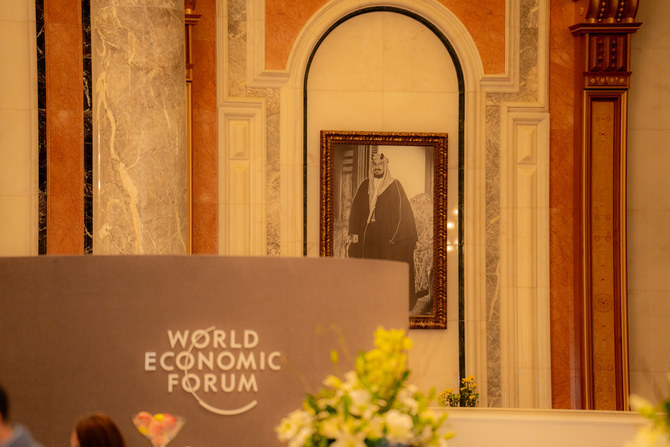
- Saudi Arabia 'really a driver of not only the economy of the region, but also the economy of the world,' says global vice chair and chair of Europe, MENA at consulting firm AlixPartners
RIYADH: Saudi Arabia’s role in technology advancement is helping to drive not only the regional but also the global economy, business leaders told Arab News at the World Economic Forum special meeting in Riyadh on Sunday.
The Kingdom has been “at the forefront” on artificial intelligence, Stefano Aversa, global vice chair and chair of Europe, the Middle and North Africa at consulting firm AlixPartners, said.
While the war in Gaza and broader Middle East tensions are expected to get top billing at the WEF Special Meeting on Global Collaboration, Growth and Energy for Development, technology’s role as a driver of change is also expected to be a major talking point.
Around 1,000 leaders from 92 countries have gathered in Riyadh for the two-day forum.
Saudi Arabia is “really a driver of not only the economy of the region, but also the economy of the world,” Aversa said.
“There are a lot of investors interested, and so it is important to stay close to some of the giga-projects here that will drive not only the growth of the Kingdom, but also the growth of some entire sectors, like energy transition.”
He said that the Kingdom’s move from “an early stage of development to more mature selective investment” is also important.
AlixPartners CEO Simon Freakley said that disruption is a looming issue for global industries ranging from automotive and aerospace to retail.
He defined disruption as “displacement of businesses, markets, and value networks as a result of economic, societal, environmental, political, regulatory, or technological changes.”
Freakley told Arab News that shipping routes, for example, faced disruption because of tensions in the Red Sea.
“Problems are caused by conflicts around the world or other challenges. What we’re finding is some of these themes go cross-industry, not just within industry.”
AlixPartners has 26 offices in 14 countries. Its fifth annual Disruption Index, based on a survey of 3,100 senior executives around the world, showed that 61 percent of CEOs worry they will be unable to keep pace with changing business cycles.
Freakley said: “This disruption work that we now do every year has become a sort of a touchstone of how we help people understand what the best companies, the best leaders, are doing.”
The consulting firm has predicted AI will become the single biggest driver of change across industries, not only as a defense against competitors, but also as a tool to enhance go-to market strategies.
“The people that are winning are the people that have the best data, and weaponize their data to actually get a competitive advantage. How people are using AI and the insight from their data to drive their growth is where we see the real opportunity,” Freakley said.
Two Russian journalists jailed on ‘extremism’ charges for alleged work for Navalny group
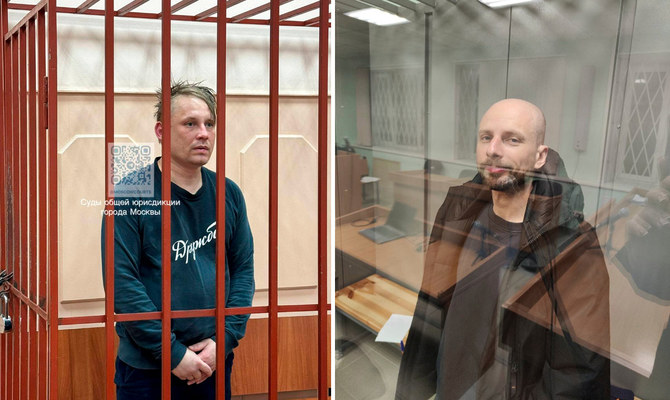
- Konstantin Gabov and Sergey Karelin both denied the charges for which they will be detained for a minimum of two months before any trials begin
- Russia’s crackdown is aimed at opposition figures, journalists, activists, members of the LGBTQ+ community, and other dissenters
LONDON: Two Russian journalists were arrested by their government on “extremism” charges and ordered by courts there on Saturday to remain in custody pending investigation and trial on accusations of working for a group founded by the late Russian opposition politician Alexei Navalny.
Konstantin Gabov and Sergey Karelin both denied the charges for which they will be detained for a minimum of two months before any trials begin. Each faces a minimum of two years in prison and a maximum of six years for alleged “participation in an extremist organization,” according to Russian courts.
They are just the latest journalists arrested amid a Russian government crackdown on dissent and independent media that intensified after its full-scale invasion of Ukraine more than two years ago. The Russian government passed laws criminalizing what it deems false information about the military, or statements seen as discrediting the military, effectively outlawing any criticism of the war in Ukraine or speech that deviates from the official narrative.
A journalist for the Russian edition of Forbes magazine, Sergei Mingazov, was detained on charges of spreading false information about the Russian military, his lawyer said Friday.
Gabov and Karelin are accused of preparing materials for a YouTube channel run by Navalny’s Foundation for Fighting Corruption, which has been outlawed by Russian authorities. Navalny died in an Arctic penal colony in February.
Gabov, who was detained in Moscow, is a freelance producer who has worked for multiple organizations, including Reuters, the court press service said. Reuters did not immediately comment on the ruling by the court.
Karelin, who has dual citizenship with Israel, was detained Friday night in Russia’s northern Murmansk region.
Karelin, 41, has worked for a number of outlets, including for The Associated Press. He was a cameraman for German media outlet Deutsche Welle until the Kremlin banned the outlet from operating in Russia in February 2022.
“The Associated Press is very concerned by the detention of Russian video journalist Sergey Karelin,” the AP said in a statement. “We are seeking additional information.”
Russia’s crackdown on dissent is aimed at opposition figures, journalists, activists, members of the LGBTQ+ community, and ordinary Russians critical of the Kremlin. A number of journalists have been jailed in relation to their coverage of Navalny, including Antonina Favorskaya, who remains in pre-trial detention at least until May 28 following a hearing last month.
Favorskaya was detained and accused by Russian authorities of taking part in an “extremist organization” by posting on the social media platforms of Navalny’s Foundation. She covered Navalny’s court hearings for years and filmed the last video of Navalny before he died in the penal colony.
Kira Yarmysh, Navalny’s spokeswoman, said that Favorskaya did not publish anything on the Foundation’s platforms and suggested that Russian authorities have targeted her because she was doing her job as a journalist.
Evan Gershkovich, a 32-year-old American reporter for The Wall Street Journal, is awaiting trial on espionage charges at Moscow’s notorious Lefortovo Prison. Both Gershkovich and his employer have vehemently denied the charges.
Gershkovich was detained in March 2023 while on a reporting trip and has spent over a year in jail; authorities have not detailed what, if any, evidence they have to support the espionage charges.
The US government has declared Gershkovich wrongfully detained, with officials accusing Moscow of using the journalist as a pawn for political ends.
The Russian government has also cracked down on opposition figures. One prominent activist, Vladimir Kara-Murza was sentenced to 25 years.
US State Department Arabic spokesperson resigns in opposition to Gaza policy
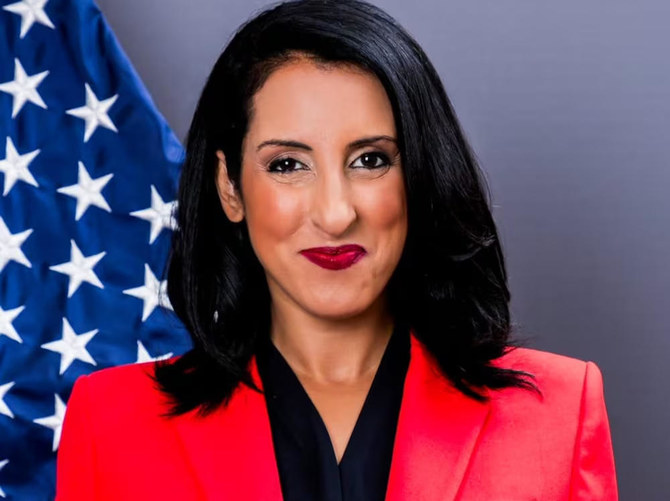
- Hala Rharrit is at least the third person to resign from the department over the issue
WASHINGTON: The Arabic language spokesperson of the US State Department has resigned, citing her opposition to Washington’s policy related to the war in Gaza, in at least the third resignation from the department over the issue.
Hala Rharrit was also the Dubai Regional Media Hub’s deputy director and joined the State Department almost two decades ago as a political and human rights officer, the department’s website showed.
“I resigned April 2024 after 18 years of distinguished service in opposition to the United States’ Gaza policy,” she wrote on social media website LinkedIn. A State Department spokesperson, asked about the resignation in Thursday’s press briefing, said the department has channels for its workforce to share views when it disagrees with government policies.
Nearly a month earlier, Annelle Sheline of the State Department’s human rights bureau announced her resignation, and State Department official Josh Paul resigned in October.
A senior official in the US Education Department, Tariq Habash, who is Palestinian-American, had stepped down in January.
The United States has come under mounting criticism internationally and from human rights groups over its support for Israel amid Israel’s ongoing assault in Gaza that has killed tens of thousands and caused a humanitarian crisis.
There have been reports of signs of dissent in the administration of President Joe Biden as deaths continue to grow in the war.
In November, more than 1,000 officials in the US Agency for International Development (USAID), part of the State Department, signed an open letter calling for an immediate ceasefire. Cables criticizing the administration’s policy have also been filed with the State Department’s internal “dissent channel.”
The war has also caused intense discourse and anti-war demonstrations across the United States, Israel’s most important ally.
Palestinian Islamist group Hamas attacked Israel on Oct. 7, killing 1,200 people, according to Israeli tallies. Israel has killed over 34,000 people in Hamas-governed Gaza, according to Gaza’s health ministry, leading to widespread displacement, hunger and genocide allegations that Israel denies.
Burkina Faso suspends BBC, VOA radio broadcasts over killings coverage
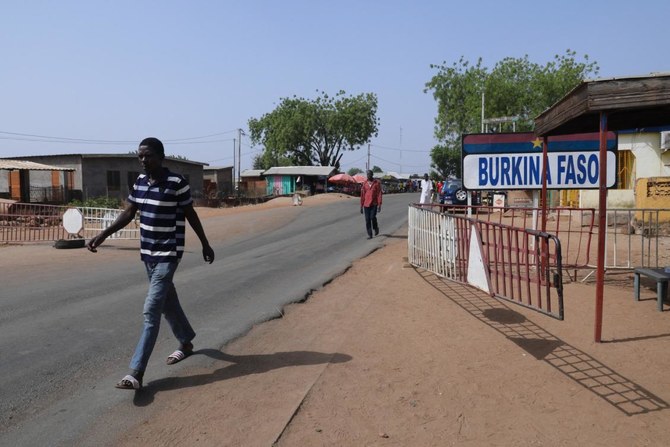
- Authorities handed two-week suspension for covering of report accusing the army of extrajudicial killings
- Human Rights Watch report says military executed about 223 villagers, including at least 56 children
LONDON: Burkina Faso has suspended the radio broadcasts of BBC Africa and the US-funded Voice of America (VOA) for two weeks over their coverage of a Human Rights Watch (HRW) report accusing the army of extrajudicial killings, authorities said late on Thursday.
In the report based on its own investigation, the rights watchdog said the West African country’s military summarily executed about 223 villagers, including at least 56 children, in February as part of a campaign against civilians accused of collaborating with jihadist militants.
HRW said the Burkinabe army has repeatedly committed mass atrocities against civilians in the name of fighting terrorism, and it called on authorities to investigate the massacres.
The country’s communication council said HRW’s report contained “peremptory and tendentious” declarations against the army likely to create public disorder and it would suspend the programs of the broadcasters over their coverage of the story.
Authorities also said in a statement they had ordered Internet service providers to suspend access to the websites and other digital platforms of the BBC, VOA and Human Rights Watch from Burkina Faso.
“VOA stands by its reporting about Burkina Faso and intends to continue to fully and fairly cover events in that country,” Acting VOA Director John Lippman said in a statement.
“The Voice of America strictly adheres to the principles of accurate, balanced and comprehensive journalism, therefore, we ask the government of Burkina Faso to reconsider this troubling decision.”
HRW conducted its investigation after a regional prosecutor said in March that about 170 people were executed by unidentified assailants during attacks on the villages of Komsilga, Nodin and Soro.
Burkina Faso is one of several Sahel nations that have been struggling to contain Islamist insurgencies linked to Al-Qaeda and Islamic State that have spread from neighboring Mali since 2012, killing thousands and displacing millions.
Frustrations over authorities’ failure to protect civilians have contributed to two coups in Mali, two in Burkina Faso and one in Niger since 2020.








